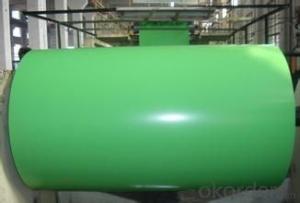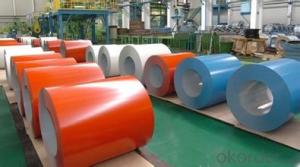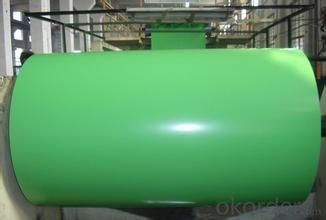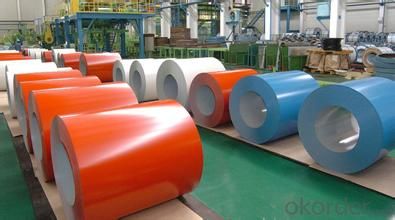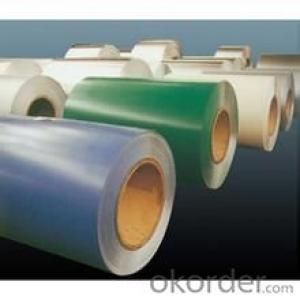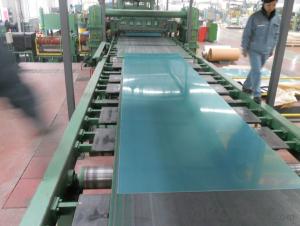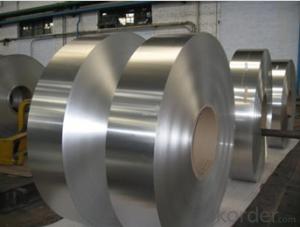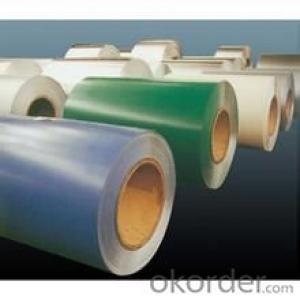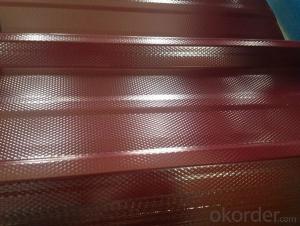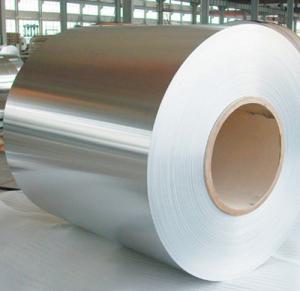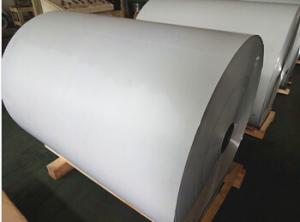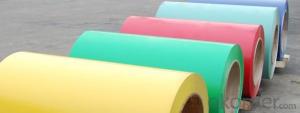Quality Aluminum Coil - Full-Coloured Alu-Coil
- Loading Port:
- China Main Port
- Payment Terms:
- TT OR LC
- Min Order Qty:
- -
- Supply Capability:
- -
OKorder Service Pledge
OKorder Financial Service
You Might Also Like
Aluminium is a relatively soft, durable, lightweight, ductileand malleablemetalwith appearance ranging from silvery to dull gray, depending on the surfaceroughness. It is nonmagnetic and does not easily ignite. A fresh film ofaluminium serves as a good reflector (approximately 92%) of visible lightand an excellent reflector (as much as 98%) of medium and far infraredradiation. The yield strength of pure aluminium is 7–11 MPa,while aluminium alloys have yield strengths ranging from200 MPa to 600 MPa. Aluminium has about one-third the densityand stiffness of steel. It is easily machined,cast, drawn and extruded.
Aluminium alloys (or aluminum alloys; see spellingdifferences) are alloysin which aluminium(Al) is the predominant metal. The typical alloying elements are copper, magnesium,manganese,silicon,tin and zinc. There are twoprincipal classifications, namely casting alloys and wrought alloys, both of which are furthersubdivided into the categories heat-treatableand non-heat-treatable. About 85% of aluminium is used for wrought products,for example rolled plate, foils and extrusions.Cast aluminium alloys yield cost-effective products due to the low meltingpoint, although they generally have lower tensile strengthsthan wrought alloys. The most important cast aluminium alloy system is Al–Si,where the high levels of silicon (4.0–13%) contribute to give good castingcharacteristics. Aluminium alloys are widely used in engineering structures andcomponents where light weight or corrosion resistance is required
Specification:
Alloy: AA1050, 1060, 1100,AA3003, 3005, 3015, 5052, 5754, 5083,8011, etc
Temper: H14/16/18/22/24/32,HO etc.
Thickness: 0.2mm—100mm
Width: 100mm—2300mm (Can be slitted)
Inner Diameter:508MM
Coil Weight:500kg-3000kg(Max.)
Application:Foil stock, Circles, Roofing, Can stock, Marine plate,Anti-slipery purpose in vehicles, packing and appliance.
Features:
1. Excellent quality of products
2. Quick delivery
3. Best service to clients
4. BV,SGS avalible
5. No buckle o waveness
6. Tension leveling
7. Certificate of Origin
8. Form A,E
Packaging Detail:
Carton ,Woodenpallet with plastic protection packing ,standard seaworthy packing or as yourrequest.
Production Capacity:
AnnualProduction capacity of 600,000 tons.
Products areexported to United States, Canada, U.A.E, Brazil, Mexico,Thailand, Vietnam,Nigeria etc, over 100 countries andregions all over the world.
Production Line:
CNBM aluminumproduction base is comprised of 18 aluminumannealers, 10 coil and foilmills, 4 continuous production lines, 2hot rolling production line and 3prepainted lines.
FAQ:
1. What is the form of payment?
Normally 30% TT, L/C
2. Type of quotation?
FOB, CFR, CIF
3. Port of loading?
Shanghai port
4. Delivery time?
30 days after client’s deposit
- Q: I recently had to have a course of B-12 injections (my digestive system was not properly absorbing other forms). While I felt a significant improvement in mood, energy and memory, I was very concerned to discover that the B-12 shot came with a little something extra: aluminum! I'm wondering if the benefits outweigh the potential risks - why is aluminum placed in the injection? (Are there metal free versions out there?)
- Aluminum salts have been used in vaccines for over 80 years now. They are thought to increase the body's immune response to the vaccines although it is not clear to researchers how this works. However, there is no evidence that it is harmful and the only side effect seems to be increased reddness. The odd thing is that there is usually some sort of metal in any vaccine/shot. If not aluminum salts, there's thimerosal (a mercury-based preservative). The CDC says, btw, that there is no proof that thimerosal causes any harm. However, some studies show a link between thimerosal, aluminum, and a host of other preservatives added to vaccines to autism in children. No news on how it affects adults, but research is being done with respect to Alzheimer's disease. Speak to your doctor to find out he/she has 'metal free' versions of vaccines and about your concerns. Such vaccines are available but are usually very costly to obtain manufacture so doctors usually don't order them as a result.
- Q: Can aluminum coils be used in curtain wall systems?
- Yes, aluminum coils can be used in curtain wall systems. Aluminum is a popular material choice for curtain walls due to its lightweight, durable, and corrosion-resistant properties. Aluminum coils can be easily fabricated and formed into the desired shapes and profiles required for curtain wall systems, making them a suitable option for this application.
- Q: What is the typical hardness of aluminum coils?
- The typical hardness of aluminum coils can vary depending on various factors such as the alloy composition, tempering process, and intended application. Generally, aluminum coils are manufactured in a range of hardness levels to cater to different needs and requirements. Aluminum coils can be produced in different tempers, including soft, half-hard, and full-hard. Soft aluminum coils have low hardness and are more malleable, making them suitable for applications that require easy formability such as packaging and wrapping materials. Half-hard aluminum coils are moderately hardened and offer a balance between formability and strength, making them suitable for applications like roofing and siding. Full-hard aluminum coils have the highest hardness and provide excellent strength, making them ideal for applications that require structural integrity such as automotive parts and construction materials. To determine the specific hardness of aluminum coils, various testing methods such as Rockwell hardness, Vickers hardness, or Brinell hardness can be employed. These tests measure the resistance of the aluminum surface to indentation and provide a numerical value that indicates the material's hardness. However, it is essential to consult the manufacturer or supplier for specific hardness values as it can vary depending on the specific alloy and temper of the aluminum coil.
- Q: How are aluminum coils protected against galvanic corrosion?
- To protect aluminum coils from galvanic corrosion, a combination of surface treatments and protective coatings is employed. An effective method involves applying anodization, which entails treating the aluminum with an acid solution through electrolysis. This process forms a protective oxide layer on the surface, acting as a barrier against direct contact with other metals that could cause galvanic corrosion. Alternatively, a protective coating such as a polymer or paint can be used on the aluminum coils. These coatings create a physical barrier, shielding the metal from corrosive elements in the environment. Careful consideration is given to selecting coatings that adhere well to the aluminum surface and exhibit excellent resistance to corrosion. Aside from surface treatments and coatings, proper design and material selection are crucial in safeguarding aluminum coils against galvanic corrosion. Avoiding direct contact between dissimilar metals and opting for compatible materials helps minimize the risk of corrosion. Isolation materials, such as gaskets or insulating tapes, can be utilized to separate the aluminum coil from other metals in contact. Regular maintenance and cleaning also contribute to protection against galvanic corrosion. It is essential to regularly remove accumulated dirt, debris, and corrosive substances from the aluminum coils to prevent the formation of localized corrosion cells. In conclusion, a combination of surface treatments, protective coatings, proper design, and regular maintenance is vital in preserving the longevity and performance of aluminum coils in various applications.
- Q: What is the average lifespan of an aluminum coil?
- The lifespan of an aluminum coil can differ depending on several factors, including the quality of the aluminum, the environment it encounters, and the level of maintenance and care it receives. Generally, aluminum coils are known for being durable and having a long lifespan. Typically, a properly installed and well-maintained aluminum coil can endure for 15 to 30 years. However, it is essential to note that this is merely an average estimation, and some coils may last even longer if properly cared for. Various elements can impact the longevity of an aluminum coil, such as exposure to severe weather conditions like extreme heat, cold, or humidity, as well as exposure to corrosive substances or chemicals. Consistently cleaning and maintaining the coil, including the removal of debris and addressing any signs of damage or wear, can also assist in extending its lifespan. To summarize, the average lifespan of an aluminum coil usually ranges from 15 to 30 years, but it is crucial to consider multiple factors that can influence its durability. Regular maintenance and appropriate care can significantly prolong the lifespan of an aluminum coil.
- Q: Are aluminum coils suitable for electrical conductors?
- Aluminum coils, indeed, prove to be suitable for electrical conductors. Due to its remarkable electrical conductivity, aluminum has become a widely utilized material in the electrical industry. It possesses approximately 61% conductivity in comparison to copper, the utmost commonly employed metal for electrical conductors. Lightweight, cost-effective, and possessing good thermal conductivity, aluminum coils have become a favored selection for a range of electrical applications. Nonetheless, it is noteworthy that aluminum has a lower tensile strength than copper, thus potentially demanding a larger cross-sectional area to attain an equivalent level of current carrying capacity. Furthermore, to prevent oxidation and guarantee efficient electrical conductivity in aluminum coils, it is imperative to employ proper insulation and connectors.
- Q: How are aluminum coils processed and shaped into different forms?
- To shape aluminum coils into various forms, a series of processes is undergone. Initially, the coils are uncoiled and straightened in the uncoiling process, facilitating easier handling and further processing. Following this, a cleaning process is conducted to eliminate any dirt, grease, or impurities present on the coil's surface. This step guarantees a smooth and clean finish for the final product. After cleaning, the coil usually undergoes a sequence of heat treatments to enhance its mechanical properties. This process, known as annealing, entails heating the coil to a specific temperature and gradually cooling it down. Annealing increases the aluminum's ductility, making it more pliable and easier to shape. Once annealed, the coil can be shaped into different forms using various techniques. One prevalent approach is roll forming, where the coil is passed through a series of rollers that gradually bend and shape it according to the desired form. Roll forming is commonly utilized for producing sheets, strips, or tubes. Another popular technique is stamping, which involves utilizing a die and press to cut or shape the aluminum coil into specific shapes. Stamping is frequently employed to create intricate designs or components with precise dimensions. Aside from roll forming and stamping, other methods like extrusion, bending, and welding can also be employed to shape aluminum coils into different forms. These processes enable the production of a vast range of products, including automotive parts, household appliances, and construction materials. Overall, the processing and shaping of aluminum coils encompass a combination of cleaning, heat treatment, and diverse forming techniques. These processes ensure that the aluminum is transformed into the desired form while maintaining its structural integrity and desired properties.
- Q: I would like to order 25 micron diameter 99.99% Aluminum wire required to use for making electrical connections. Only several cm are needed, so I would like to purchase a small spool. Delivery ASAP preferable (overnight or two day shipping would be best). This wire will be attached by hand using epoxy and not using a wire bonder.
- If they can't help, try asking the tech support guys at the wirebond manufacturers and the tool manufacturers. KS in the US and Shinkawa in Japan used to be the big guys. You can search for ultrasonic bond tools. You can also check with superconducting research centers; several private and public ones. Researchers might loan you materials and/or bonding support. BTW, Al critical temp is reportedly about 1.2°K, pretty tough to get that cold! U/S bond wire has 1% silicon, partly for hardness, you can probably bond pure wire though. Key is breaking up the oxide. Maybe bonding at cold temps and/or in vacuum would work. Also, I doubt epoxy would be good or superconducting at the temps. Al filled epoxy is unreliable electrical conductor due to oxide formation. Will be a bear to handle such fine wires without a bonder! Good luck!
- Q: Can aluminum coils be used in food packaging?
- Yes, aluminum coils can be used in food packaging. Aluminum is a safe and versatile material that has been widely used in the food packaging industry for many years. It offers various benefits such as being lightweight, resistant to corrosion, and having excellent thermal conductivity. These properties make it ideal for food packaging applications where it is important to preserve the quality, freshness, and safety of the food products. Aluminum coils can be easily formed into different shapes and sizes, allowing for customized packaging solutions. Additionally, aluminum is a sustainable material as it is 100% recyclable, which further enhances its appeal for food packaging.
- Q: Are aluminum coils suitable for insulation purposes?
- No, aluminum coils are not suitable for insulation purposes.
Send your message to us
Quality Aluminum Coil - Full-Coloured Alu-Coil
- Loading Port:
- China Main Port
- Payment Terms:
- TT OR LC
- Min Order Qty:
- -
- Supply Capability:
- -
OKorder Service Pledge
OKorder Financial Service
Similar products
Hot products
Hot Searches
Related keywords
